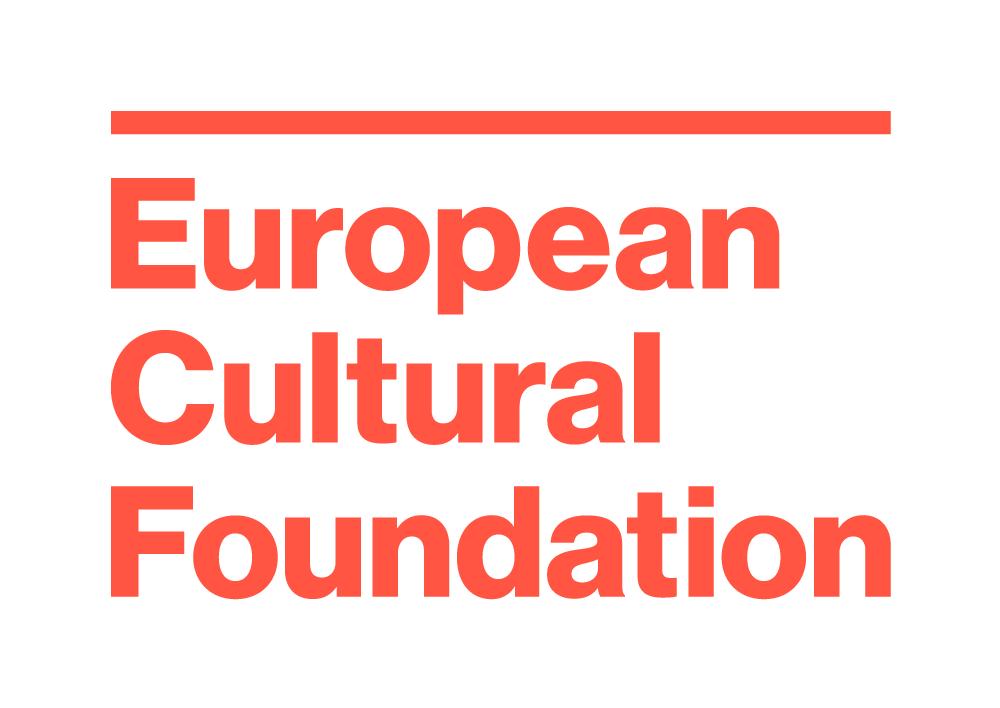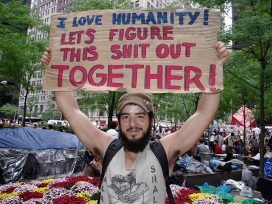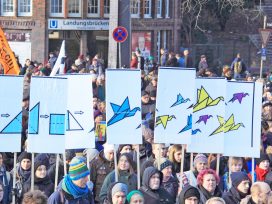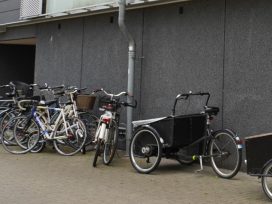Utopian dreams beyond the border
If the financial crisis divided the EU between creditors and debtors, opening a gap between North and South, the refugee crisis re-opened the gap between East and West. What we witness today, writes Ivan Krastev, is not what Brussels describes as a lack of solidarity, but a clash of solidarities: national, ethnic and religious solidarity chafing against our obligations as human beings.
A decade ago, the Hungarian philosopher and former dissident Gaspar Miklos Tamas observed that the Enlightenment, in which the idea of the European Union is intellectually rooted, demands universal citizenship. But universal citizenship requires one of two things to happen: either poor and dysfunctional countries have to become places in which it is worthwhile to be a citizen, or Europe has to open its borders to everybody. Neither is going to happen anytime soon, if ever. Today the world is populated by many failed states nobody wants to be a citizen of, and Europe neither has the capacity nor will its voters ever agree to keep the borders open. So the real debate in Europe is not whether the European Union should make its borders harder to cross – it is clear that it should; the split is over whether we should feel morally right in doing so and how we should best help the most vulnerable people in the world.
Dictatorship of global comparison
In 1981, when researchers at the University of Michigan conducted the first World Values Survey, they were surprised to find that nations’ happiness was not determined by material well-being. Back then Nigerians were as happy as West Germans. But now, 35 years later, the situation has changed. According to the latest surveys, in most places people are as happy as their GDP would predict. What has happened in the intervening years is that Nigerians have gotten TV sets and the spread of the Internet has made it possible for young Africans or Afghans to see how Europeans live and what their schools and hospitals look like. Globalization has made the world a village, but this village lives under a dictatorship – the dictatorship of global comparisons. People do not compare their lives with the lives of their neighbours anymore: they compare themselves with the most prosperous inhabitants of the planet.
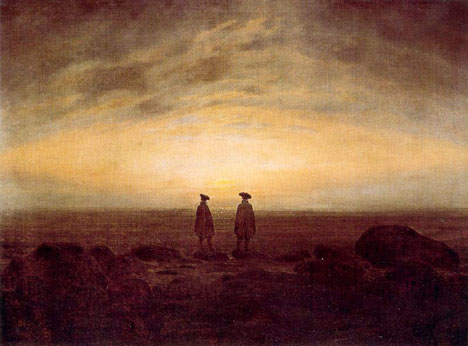
Caspar David Friedrich,, 1817, 66 x 51 cm. Alte Nationalgalerie, Berlin. Source:Wikimedia
In this connected world of ours, migration is the new revolution – not the twentieth-century revolution of the masses, but a twenty-first century exit-driven revolution enacted by individuals and families and inspired not by the pictures of the future painted by ideologues but by Google Maps’ photos of life on the other side of the border. It offers radical change now. This new revolution does not require ideology, political movements or political leaders to succeed. So we should not be surprised that for many of the wretched of the earth crossing the European Union’s border is more attractive than any utopia. For a growing number of people, the idea of change means changing the country where you live, not the government you live under.
The problem with this migrants’ revolution is that it has a worrying capacity to inspire a counter-revolution in Europe.
“Open door policy” under threat
The myriad acts of solidarity toward refugees fleeing war and persecution that we saw months ago are today overshadowed by their inverse: a raging anxiety that these same foreigners will compromise Europe’s welfare model and traditional culture and that they will destroy our liberal societies. Fear of Islam, terrorism, rising criminality and a general anxiety over the unfamiliar are at the core of Europe’s moral panic. Europeans are overwhelmed not by the more than one million refugees who have asked for asylum but by the prospect of a future in which the European Union’s borders are constantly stormed by refugees or migrants.
Even before Cologne, the majority of Germans had started to doubt their government’s open door policy. Chancellor Angela Merkel, who until recently was the symbol of the European Union’s self-confidence and resilience, is now portrayed as a Gorbachev-like figure, noble but naive, somebody whose “we can do it” policy has put Europe at risk.
The refugee crisis has forced the EU to confront the question of its borders. It signaled that the threatened majorities that have emerged as a major force in European politics fear and loathe a “world without borders” and demand a European Union with clearly defined and well-protected borders. These threatened majorities fear that foreigners are taking over their countries and threatening their way of life, and they are convinced that the current crisis is brought on by a conspiracy between cosmopolitan-minded elites and tribal-minded immigrants.
In short, the refugee crisis is changing European politics and threatening the European project in a way that neither the financial crisis nor the conflict with Russia has.
If the financial crisis divided the EU between creditors and debtors, opening a gap between North and South, the refugee crisis re-opened the gap between East and West. What we witness today is not what Brussels describes as a lack of solidarity, but a clash of solidarities: national, ethnic and religious solidarity chafing against our obligations as human beings. The refugee crisis made it clear that the European East views the very cosmopolitan values on which the European Union is based as a threat, while for many in the West it is precisely those cosmopolitan values that are the core of the new European identity.
“I can comprehend only with difficulty”, German president Joachim Gauck confessed, “when precisely those nations whose citizens, once themselves politically oppressed and who experienced solidarity, in turn withdraw their solidarity for the oppressed”.
Coalition of the unwilling
Three decades ago “Solidarity” was the symbol of central Europe and dissident intellectuals claimed that the difference between the East and the West is that the East truly believes in the European Union while the West only belongs to it. So why is it that today central Europeans have become so estranged from the fundamental values that underpin the European Union and unwilling to show solidarity with the sufferings of others?
The scandal of East Europeans’ behavior as viewed from the West is not their readiness to build fences to keep out refugees at the very places where walls were destroyed only 25 years ago, but their claim that “we do not owe anything to these people”. While in Germany almost ten per cent of the population took part in various volunteer initiatives aimed at helping the asylum seekers in eastern Europe, the public in eastern Europe remains unmoved by the tragedy of the refugees, and leaders there have lambasted Brussels’s decision to redistribute refugees among European Union member states. Prime minister Robert Fico of Slovakia has asserted that his country would be prepared to accept only Christians (there are no mosques in Slovakia, he argued, so Muslim have nothing to do in his country). The leader of the governing Law and Justice party in Poland, Jaroslaw Kaczynski, warned that accepting refugees is a health risk because they would bring unknown and dangerous diseases with them. Hungary’s Viktor Orbn argues that the European Union’s moral duty is not to help the refugees, but to guarantee the security of its own citizens. If in most West European countries the refugee crisis polarized societies, pitting advocates of an open door policy against its critics, causing a confrontation between those who open their houses to the refugees and those who are burning refugee camps, in Central and Eastern Europe, the crisis united otherwise fragmented societies in their almost unanimous hostility towards the refugees. It is one of the few times in recent years that governments are saying what the overwhelming majority of people think. While Germans were trying to make sense of East Europeans’ compassion deficit, East Europeans were puzzled why Germans who were not ready to foot the bill for the Greeks are eager to help Syrians and Afghans.
The Central European resentment of refugees looks odd if we take into account two things: first, that for most of the twentieth-century people in Central and Eastern Europe were preoccupied either with emigrating or with taking care of immigrants. Second, that at present there are simply no Syrian refugees in most Central and East European countries. In 2015, the number of refugees who entered Slovakia, for example, was 169 people and only eight of them asked to stay.
The return of the East-West divide in Europe is not an accident or bad luck. It has its roots in history, demography and the twists of post-communist transition, while at the same time representing a central European version of popular revolt against globalization.
Historical reasons
History matters in Central and Eastern Europe and very often the region’s historical experience contradicts some of the promises of globalization. More so than any other place in Europe, central Europe is aware of both the advantages but also the dark sides of multiculturalism. While in the western half of Europe it was the legacy of the colonial empires that shaped encounters with the non-European world, central European states were born of the disintegration of empires and the processes of ethnic cleansing that followed. The nineteenth-century ethnic landscape of western Europe was harmonious, like a Caspar David Friedrich landscape, whereas that of central Europe was more like a Kokoschka. While in the pre-war period Poland was a multicultural society where more than a third of the population was German, Ukrainian, or Jewish, today Poland is one of the most ethnically homogeneous societies in the world with 98 per cent of the population being ethnic Poles. For many of them the return to ethnic diversity is a return to the troubled times of the interwar period. And while the European Union is founded on the French notion of the nation (where belonging is defined as loyalty to the institutions of the Republic) and the German notion of the state (powerful Länder and a relatively weak federal centre), central European states were built on the reverse: they combine a French admiration for the centralized and all-powerful state with the idea that citizenship means common descent and shared culture, as held by the Germans.
In the view of the French political scientist Jacques Rupnik, central Europeans have been particularly outraged by Germany’s criticism directed against them during the refugee crisis, because it was precisely from nineteenth-century Germans that central Europeans borrowed the idea of the nation as cultural unity.
Post-communist transition
But central Europe’s resentment of the refugees is rooted not only in its long history but also in the experiences of post-communist transition. What came after communism and liberal reforms was pervasive cynicism. Central Europe is a world champion in the mistrust of institutions. Faced with an influx of migrants and haunted by economic insecurity, many East Europeans feel betrayed in their hope that joining the European Union would mean the beginning of prosperity and life without crises.
Being poorer than western Europeans, they point out, how can anyone expect solidarity from us? We were promised tourists, not refugees. The tourist and the refugee have become symbols of the two faces of globalization. Tourists represent the version of globalization we like. Attracting tourists and rejecting migrants: that’s a short summary of eastern Europe’s view of the ideal world. The tourist is the benevolent foreigner. He comes, spends, smiles, admires and leaves. He makes us feel connected to the larger world, without imposing its problems on us. In contrast, the refugee, who could have been yesterday’s tourist, is the symbol of the threatening nature of globalization. He comes bringing with him all the misery and trouble of the larger world.
Demography
Curiously, demographic panic is one of the least discussed factors shaping East Europeans’ behavior towards refugees. But it is a critical one. Nations and states have the habit of disappearing in the recent history of Central and Eastern Europe. In the last 25 years, around 10 per cent of Bulgarians have left the country in order to live and work abroad. According to United Nations projections, Bulgaria’s population is expected to shrink by 27 per cent by 2050. Alarm over “ethnic disappearance” can be felt in many of the small nations of eastern Europe. For them the arrival of migrants signals their exit from history, and the popular argument that an aging Europe needs migrants only strengthens the growing sense of existential melancholy. When you watch on television scenes of elderly locals protesting the settlement of refugees in their depopulated villages where not a single child has been born for decades, your heart breaks for both sides – the refugees, but also the old, lonely people who have seen their worlds melt away. Is there going to be anyone left to read Bulgarian poetry in 100 years? Moreover, communist-imposed secularism made Central and East Europeans very sensitive to the risk of the destruction of their Christian identity. One does not need to be a believer today to be worried about the future of Christianity and its culture in Central and Eastern Europe. It is also worth remembering that Central and Eastern Europe is the part of Europe that has probably the most complex relationship with Islam. In that region you have two types of countries: countries like Bulgaria, which has the biggest Muslim minority in Europe and is on the border with the Muslim world, and countries like Slovakia, a country without a single mosque. For opposite reasons, both Bulgaria and Slovakia feel very nervous at the idea that most of the refugees are Muslims.
The failed integration of the Roma also contributes to Eastern Europe’s compassion deficit. East Europeans fear foreigners because they mistrust the capacity of their society and state to integrate the “others” already in their midst. In many East European countries the Roma are not simply unemployed but unemployable because they drop out of school very early and fail to acquire the skills needed for the twenty-first-century job market. It was the failure of Roma integration that makes East Europeans believe that their countries “cannot do it”. And the fact that East Europeans and refugees coming from Asia or the Middle East quite often end up as competitors on the western job market do not make East Europeans more open to the politics of integrating those refugees. Citizens of the Western Balkan countries are probably the most powerful example of the collateral damage of the current crisis – according to the plan to deal with the growing influx of refugees entering Germany they are to be sent back home without the hope that they can one day return to the EU.
Resentment of cosmopolitanism
But at the end of the day, it is Central Europe’s deeply rooted mistrust towards a cosmopolitan mindset that divides East and West. The current resentment of cosmopolitanism, which in many aspects reminds us of the successes of the anti-cosmopolitan campaigns in Stalin-dominated Europe, is well captured by the growing eagerness of voters to support nativist political leaders whose major advantage is that they do not speak foreign languages, have no interest in foreign cultures and avoid visiting Brussels.
Writer Joseph Roth spent most of the interwar years wandering around Europe and taking refuge in the lobbies of grand hotels because for him hotels were the last remnants of the old Habsburg empire, a postcard from a lost world, a place where he felt at home. Some central European intellectuals do share Roth’s nostalgia for the cosmopolitan spirit of the empire, but ordinary citizens of central Europe do not. They feel comfortable in their ethnic states and deeply mistrust those whose hearts are in Paris or London, whose money is in New York or Cyprus and whose loyalty is to Brussels. In Tony Judt’s words, “from the outset eastern and ‘central’ Europeans, whose identity consisted largely in a series of negatives – not Russian, not Orthodox, not Turkish, not German, not Hungarian and so forth – had provinciality forced upon them as an act of state making. Their elites were obliged to choose between cosmopolitan allegiance to an extraterritorial unit or idea – the Church, an empire, Communism, or, most recently “Europe” – or else the constricting horizon of nationalism and local interest”. Being cosmopolitan and at the same time a “good Pole”, “good Czech” or “good Bulgarian” is not in the cards. And it is this historically rooted suspicion of anything cosmopolitan and the direct connection between communism and internationalism that partially explains central Europe’s sensitivities when it comes to the refugee crisis. In this respect the legacies of Nazism and Communism significantly differ. The Germans’ drive for cosmopolitanism was also a way for them to flee the xenophobic legacy of Nazism, while it could be argued that Central Europe’s anti-cosmopolitanism is partially rooted in an aversion to communist-imposed internationalism.
The return of the East-West divide
So, how important will the West-East divide in Europe caused by responses to the refugee crisis be for the future of the European Union? Is it going to fade away in the way the division between Donald Rumsfeld’s “old Europe” and “new Europe” faded away at the very moment Central Europeans turned against George W. Bush’s war in Iraq, or will it lead to the emergence of a two-tier European Union? Is European solidarity possible in the absence of solidarity with the most vulnerable people in the world?
Many in central Europe today point to the hardening of anti-refugee sentiments in western Europe, arguing that Europe is no longer divided and that European unity is only one election away (elections that chanceller Merkel would lose). Now, when Germans have become disillusioned with open-door policies, the differences will be easily bridged. Many central Europeans celebrate that change of mood in the West as a victory for eastern Europe’s hard-nosed realism over the hypocritical moralism of the West. You can sense a malicious pleasure when reading central Europeans commenting on the “jewelry law” consensually adopted by the Danish Parliament. According to this law the government will confiscate any valuables of the refugees exceeding slightly more than 1000 euro. Is this what West Europeans’ compassion looks like?
But the paradox of the refugee-crisis split in the EU is that the convergence of anti-immigrant sentiments will not bring western Europe and central Europe closer. It has even separated them further. Unlike “Germany for the Germans” or “Bulgaria for Bulgarians”, the slogan “Europe for Europeans” cannot fly politically. To many conservative Germans who oppose the direction in which German society is heading, Romanians or Bulgarians are no less alien than Syrians, while for the cosmopolitan-minded Germans who embraced chancellor Merkel’s culture of refugee integration, tribal-minded Central Europeans are perceived as the major obstacle to an open-society European Union. In a sad way the split over refugees has reconfirmed all the prejudices that East and West held against each other.
This crisis also demonstrates that European solidarity cannot be divorced from its Enlightenment roots. At the same moment that East Europeans claimed that “we do not owe anything to the refugees”, many in the West realized that they owe nothing to eastern Europe either.
Published 24 June 2016
Original in English
First published by Frankfurter Allgemeine Zeitung, 1 March 2016 (German version) and IWMpost 117 (2016) (English version)
© Ivan Krastev / IWM / Eurozine
PDF/PRINTIn collaboration with
In collaboration with
In focal points
- Disintegration or revival?
- Mobilizing law for solidarity
- Solidarity after Machiavelli: An interview with Ira Katznelson
- Liberalism, populism and the challenges of post-transformation in eastern Europe and beyond
- The limits of solidarity
- On the borders of solidarity
- The crisis of neoliberalism in Europe
- Utopian dreams beyond the border
- The politics of nature in the Anthropocene
- Strangers when we meet: Identity and solidarity
Newsletter
Subscribe to know what’s worth thinking about.
Related Articles

Nine years ago, a slim majority of UK voters chose to leave the European Union – without a clear plan or the tools to make it happen. Five years after the de facto departure, relations are slowly being repaired, driven in part by the increasingly unpredictable political climate in the United States.

Since the collapse of Novi Sad’s train station in November, student-led protests have erupted across Serbia, inspiring a nationwide movement against corruption.
